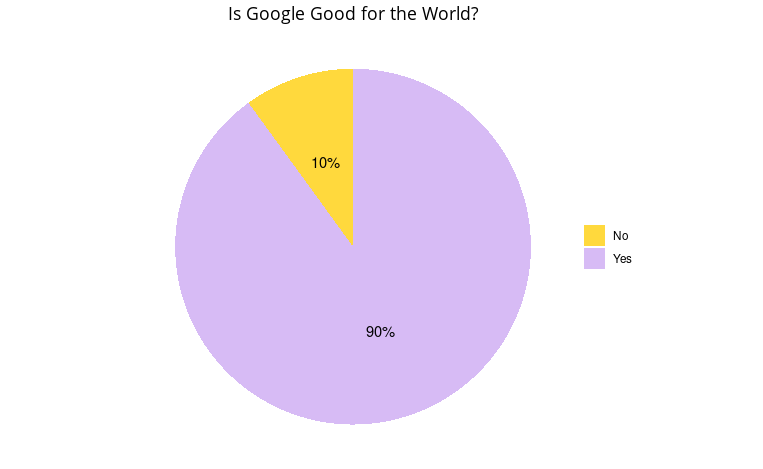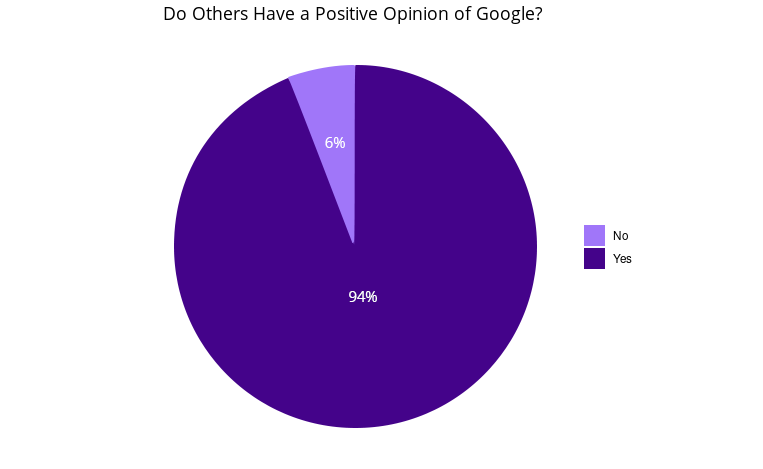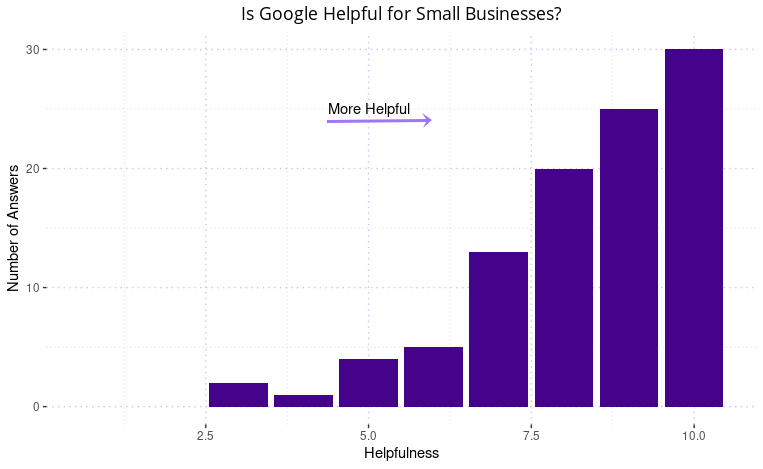“Don’t Be Evil” were the words inscribed in Google’s history as the inexperienced company rose to significance in 1998. They became words almost forgotten by time, though, when the company merged into Alphabet INC, and leadership rewrote the motto to “Do the Right Thing.”
Of course, organizations evolve, but I wanted to put Google to the test and ask people whether it was delivering on the promise it wiped away all those years ago.
As a public relations professional, I’m also fascinated by case studies, so let’s dive into the who, how, when, why, and what people think about Google.
How Many People Believe Google is Good for the World?
Not shockingly, people believe and trust in Google.
In fact, a survey of one hundred respondents discovered that ninety percent of people believe Google is good for the world.

Who founded Google?
Larry Page and Sergey Brin
The reasons that some believed Google was good for the world varied but revolved around how easily Google allowed people to access information. Some of the respondents also expressed sentiments like, “I like using the search engine to look for whatever I need, and as a bonus, I learn of other things similar to what I’m looking for.” Having knowledge at our fingertips is one reason people believe Google is good for the world. Unfortunately, this also leads to one of the many limitations of this study. It didn’t compare search engines against each other.
This is something I would love to do in future experiments, though.
The sample was also made up of individuals with mixed demographics who worked in marketing or sales. Respondents had roles within their organizations as administrative faculty, sales staff, middle management, chief financial officers, and more.
Then, there was the minority, which opposed the view that Google was good for the world. These people might be surprised to learn that nine out of ten of their peers disagree. If your livelihood depends on SEO results, or if you’re one of the handful of social media users who find themselves complaining about Google online, you might also be surprised by the overwhelming support for Google.
Complaints and criticism of Google are numerous, including:
- Google is full of spam
- Google is crushing small businesses by favoring large organizations
- Google is stealing from small businesses by doing a crappy job of advertising
- Google is monopolizing the internet
None of those “facts” play into the minds of ordinary people, though. The core of Google’s business continues to have a great time on Google. Indeed, a subset of people out there don’t like Google, but they’re firmly in the minority.
Another surprise from these results was that people believed more often that others had a positive impression of Google.
How Many People Have a Positive Impression of Google?

In the study, ninety-four percent of people believe others have a positive impression of Google.
It’s probably another non-surprise to many, but for me, the finding challenged my assumption that people assume others have negative opinions. Every survey respondent who believed Google was good for the world also assumed people agreed. This was the case in all but one of the survey responses.
When was Google founded?
1998
There was a lot of support for Google in the responses, and there was a lot of support for the small businesses that depend on Google.
Is Google Helpful for Small Businesses?
Over fifty-five percent of people think Google is helpful for small businesses. As you can see in the breakdown, Google was rated on helpfulness based on a ten-point Likert scale, where ten was the most helpful.

Many people have a very high opinion of Google, and not always for lack of knowledge. Only twenty-one percent of the respondents knew of either Google’s antitrust or privacy trials, and of those twenty-one percent, two respondents stated they didn’t believe Google was good for the world.
This result could be because of the belief that one of the respondents shared, “I feel like there are lawsuits against companies all the time.”
Most people expect Google to be a target because of its overwhelming success. So, they’re granted more grace.
Why Does Google Sentiment Matter?
Despite a vocal group of people, Google has retained its mind-grasp on its core audience. The company maintains a dominant brand position in the search market, and that’s unlikely to change.
Understanding why Google has found so much success can give us insight into not only improving our digital marketing strategies, but deciding how to spend our time.
Why Brand Leadership is Better Than Thought Leadership
What became clear from the results of this study was that Google recognizes brands and is itself the most recognizable brand. It seemed to me like some of the respondents were probably biased towards Google, and that’s something we can learn from. As digital marketers, we need to figure out a way to bias customers towards our brands.
That’s why while thought leadership is important, it’s only a part of brand leadership, and moving forward, we need to plan on putting our brand’s leadership first.
I realize Thought Leadership is the SEO word of last year and this year and maybe future years, but it’s not thought leadership that put Google on the map, it’s brand leadership.
How to be Useful for Search Engines
Google has a lot of reasons for its success, but one of the main ones is likely its mission statement.
Google’s mission statement is to make the world’s information organized and useful. The word useful startled me because anyone in SEO will recognize the word helpful.
The difference between useful and helpful is simple. utlity. Helpful doesn’t always have the same utility associated with useful. You can help and do a sloppy job, that would violate the definition of useful. So, moving forward I’m going to think about my content more in terms of usefulness.
As a content writer, I’m aiming to understand keyword intent on a deep level by looking at the SERPs I’m trying to rank for.
I want to make sure that content answers all questions directly. Don’t beat around the bush for word count. Get straight to the point and make a useful page.
Don’t Sell Your Audience Short
It’s important to meet your audience where they are, and if they’re on Google, this just solidifies how important it is to play the game. So to speak.
As SEOs, we need to continue testing and creating content that we know will rank well on Google. What is Google serving in the SERPs for the keywords you want to rank for? How can you create similar content that’s more useful?
Sentiment Might Change
Overall, these results suggest people are on the same page about how much they love Google. Our jobs as SEOs are safe for now. *Phew*
It’s always important to voice dissent and criticism, but everything seems business as usual in the world of average professionals, and Google will continue to be a source of information for billions.
We should continue to monitor the situation and evolve as the market does. For now, though, my final takeaway from the research was that it’s important to hold Google accountable to its original statement. It’s a statement we should also hold ourselves accountable too. Don’t be Evil.
